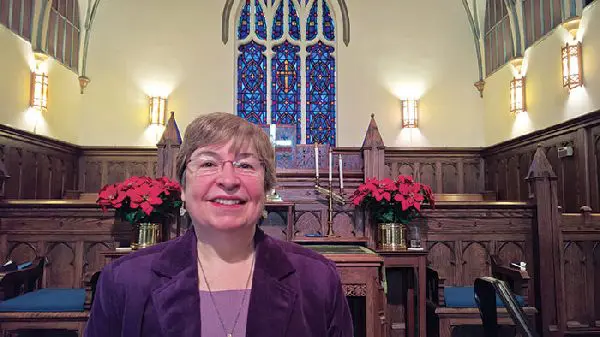
|
| Rev. Fran Hayes in front of the altar – Photos by The Arab American News |
DEARBORN — “God welcomes all, strangers and friends; God’s love is strong and it never ends,” sang Rev. Fran Hayes of Littlefield Presbyterian Church as she stood in front of the altar.
Hayes, pastor of the Dearborn-based church, said her congregation begins most Sundays by chanting that song as a reminder that God’s love is inclusive of everybody.
The Littlefield Presbyterian Church’s overarching mission is to embrace people of all faiths and cultures and learn about how others worship God, Hayes said.
She said that’s the approach members of the Presbyterian denomination strive to live by. She added that Littlefield Church has been making an effort to build bridges with the Arab and Muslim communities since the 1930’s.
“There’s a strong stream of progressive thinking that values inclusivity and justice,” Hayes said.
She said the relationship flourished during the 1967 riots. Hayes said the church recognized early on that its neighborhood was changing and interpreted that as an opportunity to form friendships with new Arab immigrants.
Littlefield’s previous pastor, Dr. William G. Gepford, thought of reaching out to the new neighbors at a time when it wasn’t popular to do so.
Hayes said Gepford and his wife were missionaries in Lebanon until a civil war started in 1975, making Gepford a natural pioneer in forming alliances with Muslim newcomers in Dearborn.
She added that the church decided early on not to attempt to convert Muslims to Christianity.
Today, Littlefield Presbyterian Church actively defends Arabs and Muslims on social media and is involved in various interfaith activities.
According to Hayes, the Presbyterian Church was the first of the large Christian denominations to divest from corporations that profit from the Israeli occupation of Palestine.
Years ago, Littlefield Presbyterian Church hosted a “Peace Camp” that focused on teaching the community’s Christian and Muslim youth peaceful ways to resolve conflicts and celebrate diversity.
The church often holds interfaith discussions and invites imams, so parishioners can listen to scripture and join Muslims in group prayer, she said.
“It’s become the norm that we have some Muslims that come to our Christmas Eve party,” Hayes added.
The pastor said the church initiated an “intentional and noticeable” effort to speak out against Islamophobia after recent anti-Muslim comments expressed by some politicians.
|
Trump a Presbyterian?
Republican presidential candidate Donald Trump, who proclaims himself a Presbyterian Christian, says he plans to ban Muslims from entering the United States.
Many Presbyterian officials have denounced Trump, calling his policies un-Christian.
On Sunday, Jan. 24, less than two weeks before the Iowa caucuses, Trump sat in the pew of a Presbyterian church, only to later be taught a lesson about accepting others by Rev. Pamela Saturnia.
Hayes knows Saturnia well and said she had no knowledge that Trump would be among the congregants when she led the sermon.
Hayes said Trump first announced he was a Presbyterian to poke fun at Ben Carson for his Seventh Day Adventist faith, until it stuck.
Trump’s sudden religiosity gave skeptical Presbyterians an opportunity to speak out against his immigration policies and demonstrate their true beliefs.
“He was trying to get points with evangelical voters in Iowa, so he thought he should go to church,” Hayes said.
The priest who heads the church where Trump was baptized, Gradye Parsons, wrote a letter to the real estate tycoon, slamming his foreign affairs and immigration policies and schooling him on Presbyterian teachings.
Parsons reminded Trump that Christ was forced to flee to Egypt with his parents, making him a refugee.
“Knowing our Lord was once a refugee, faithful Presbyterians have been writing church policy urging the welcome of refugees and demanding higher annual admissions into the United States since the refugee crisis of World War II,” Parsons wrote.
“We have pushed for due process at the border and we continue to petition for immigration reform that includes a path to citizenship for undocumented persons,” he continued. “I also respect that we came uninvited to a land already occupied by people. This creates a sense of humility about my citizenship that shapes my views on those who seek a place here. I hope you will find this helpful. I especially hope it will inform you on your policies going forward.”
Blind men and the elephant

|
| A painting representing building bridges |
Back at Littlefield Church, Hayes said one of the most interesting questions she gets from young Muslims who visit is about the corruption of passages in the Bible. She said some Muslims are taught that the Quran is the only religious text that has remained unchanged.
Hayes said such views could be used by those seeking ammunition to declare their religion better than others.
However, she urges people of different faiths to learn about each other’s scriptures.
“God taught us another way — the way of love,” she said.
“I think the best in any of our religious traditions is about love and justice.”
She explained that people of all faiths could learn from each other about God and their purpose on Earth.
Using the example of an Indian fable, she said a group of blind men, each feeling out a certain part of an elephant, can only proclaim that specific part to be representative of the animal.
One blind man, who has only felt the tail of the elephant, can only be certain that an elephant is similar to a rope; another who has only felt the elephant’s leg will be sure an elephant looks similar to a tree trunk.
Hayes said by building bridges and working together, people of all faiths and cultures can collectively resolve the mystery of life and live in harmony.







Leave a Reply